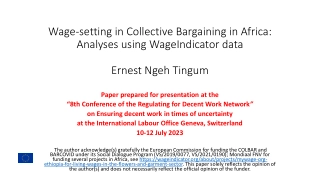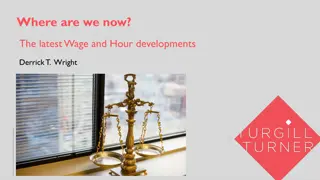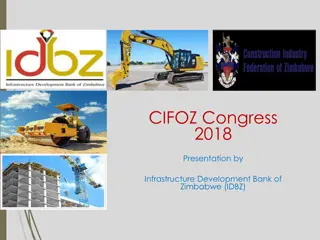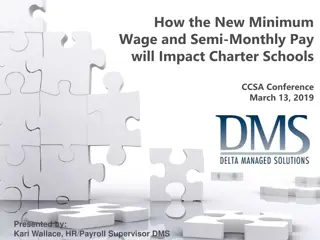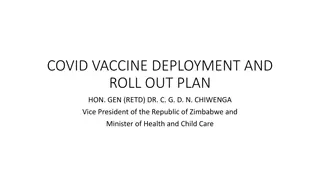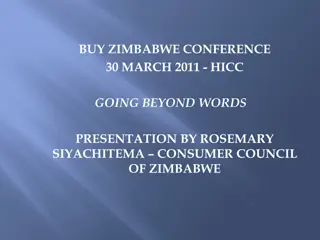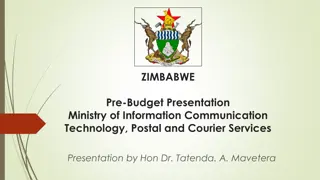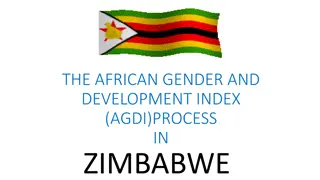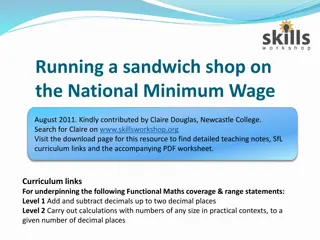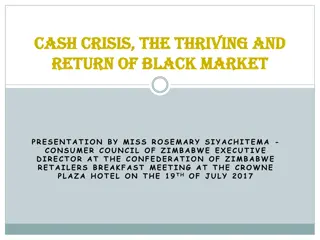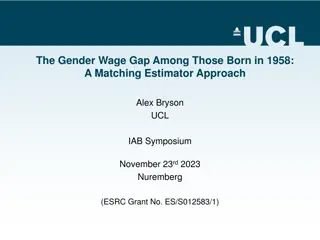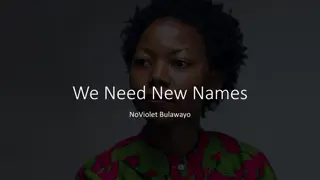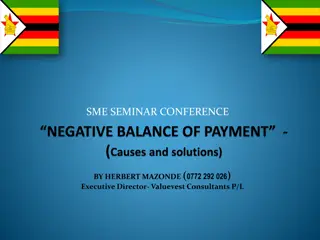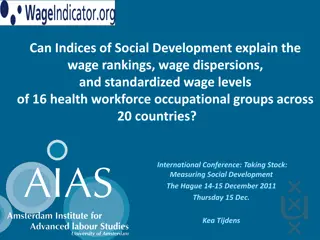Enhancing Utilization of Non-Wage Budget for Education in Zimbabwe
Addressing the underutilization of the non-wage budget for primary and secondary education in Zimbabwe from 2018 to 2022 is crucial to tackle challenges such as a significant number of out-of-school children, lack of adequate infrastructure, and insufficient teaching materials. Efforts have been made to develop accounting procedures, hold workshops on program-based budgeting, and improve collaboration between key departments. The project timeline highlights progress made in workshops and meetings to enhance budget utilization.
Uploaded on Mar 26, 2024 | 0 Views
Download Presentation

Please find below an Image/Link to download the presentation.
The content on the website is provided AS IS for your information and personal use only. It may not be sold, licensed, or shared on other websites without obtaining consent from the author. Download presentation by click this link. If you encounter any issues during the download, it is possible that the publisher has removed the file from their server.
E N D
Presentation Transcript
Underutilization of non-wage budget for Primary and Secondary Education 2018 - 2022
Problem Statement United nations sustainable development goal number 4 gives the provision of quality education to the citizens of each nation. The national constitution of Zimbabwe gives the provision of affording each school going age child an opportunity to access free basic education. The nation has a shortfall of close to 3,000 schools around the country and in the 8 rural provinces have a great number of satellite schools remain unregistered due to lack of the required infrastructure. For the registered schools, there is deteriorating infrastructure and equipment that do not match the competence based curriculum. Teaching and learning materials remain a perennial issue in the provision of improving pass rate. An estimated number adding to 2,000,000 school going age children are out of school. Beside the budget being allocated the budget utilisation remain low.
Why the problem matters? More Than 2,000,000 School Going Age Children Out Of School (Due To Lack Of Social Support) Building Of New Schools And Additional Classrooms For Expansion {Shortfall Of Schools (3000)} Improvement Of Existing Infrastructure 1,960 Satellite Schools Remain Unregistered Inadequate Teaching And Learning Materials
PROJECT TIMELINE Our Journey So far Attended Framing Workshop,, Johannesburg, South Africa February-Framing Workshop April-Development of Accounting Procedures Manual Held a national consultative and draft of the Accounting procedure manual in Mutare Zimbabwe, where all provincial accountants and administrators were represented. The workshop produced a draft Accounting Procedures Manual. A workshop was held to collect data and train key stakeholders within the Ministry on PBB. This workshop proved to be fruitful as there was expression of much appreciation from the participants. We discovered that most people where not aware of what PBB was all about. Serious discussions were held between three departments. Challenges were discussed and solutions were proffered. The meeting came out with a pact that would ensure transparency and smooth flow of documents and information between the three departments. 2023 June-Held workshops on Program Based Budgeting. July-Finance, Procurement and Administration Departments August-Meeting between Finance and MOPSE A meeting was held to discuss challenges and come up with solutions. The Ministry of Finance pledged its continued support to the Ministry and promised timeous release of requested resources. It was commended that the Budget Execution committee chaired by the Deputy Minister of Finance continue to sit.
2018- 2022 BUDGET REVIEW
BUDGETUTILISATION 2018-2022 80 70 % UTILISATION 60 50 40 30 20 10 0 2018 71.33 71.14 2019 70.57 70.54 2020 68.73 67.55 YEAR 2021 54.87 50.07 2022 75.54 71.61 % Release Utilisation % Budget utilisation % Release Utilisation % Budget utilisation
Entry points and ideas for action
Planning Held capacity development workshops to strengthen planning Held workshops on Programme Based Budgeting Highlighted and taught the importance of having Annual Work Plans and how they help to track progress Emphasized on departmental request for goods and services
Procurement Process Departments to initiate the process by requesting for the purchase of goods and services Procurement Management Unit to train staff on the processes Procurement Management Unit to assist departments in the preparation of the Annual and Individual Procurement Plans Procurement Management Unit to be decentralised
Inadequate Staff Development on PFM Have competent suitably qualified personnel placed in key departments Allow employees to give feedback in whatever is affecting the operations Sharing information after attending trainings and workshops Having competent staff to facilitate at the training workshops Availing the required resources to enable effective training sessions
Policy coordination and inconsistence Advocating for consultations to take place before political announcements Having clear guidelines to support and strengthen the agreed policies Having support from management on willingness of policies
No clear communication and defined roles Having consultations for the preparation of the Accounting Officers Procedures Manual Setting up a steering committee to spearhead the preparation of the manual Consulting all stakeholders and departments on the day to day operations Coming up with a tailor made Accounting Officer s Procedures Manual which is not generic but the one that speaks to the daily operations of the Ministry guided by the relevant statutes
Prioritizing partner funded programmes at the expense of appropriation funded Expediting expenditure processes Advocating for adequate cash support for the operations Strengthening documents processing from the user to the final payment stage by ensuring that no one holds the documents in their offices Prioritizing the use of Appropriation funds even if we have other funds from various partners Prioritising the job factor rather than incentives
Lack of managerial commitment Delegating responsibilities and roles Having clearly defined work plans that encompasses every sub department Taking the Integrated Result Based Management Performance Appraisal System seriously
Success Non-wage budget shot up to 88.48% Training of staff on Programme Based Budgeting Training of staff on procurement processes Increased request for goods and services Started consultations on the preparation of the Accounting Officers Procedures Manual
2023 BUDGET UTILISATION 125,000,000,000.00 120,000,000,000.00 115,000,000,000.00 110,000,000,000.00 105,000,000,000.00 100,000,000,000.00 Budget Cumulative release Cumulative expenditure
Working in new ways and building capacities
New ways and building capacities Continuous training of staff on Programme Based Budgeting Continuous training of staff on procurement processes Increased advocacy for request for goods and services Continue consultations on the preparation of the Accounting Officers Procedures Manual
Next Steps Continuous training of staff on Programme Based Budgeting Continuous training of staff on procurement processes Increased advocacy for request for goods and services Continue consultations on the preparation of the Accounting Officers Procedures Manual
SIYABONGA TATENDA


